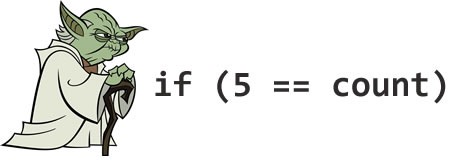Every field comes up with its own jargon, and oftentimes subgroups within a field come up with their own specific words or phrases (those of you familiar with Microsoft Canada’s Developer and Platform Evangelism Team know that we have our own term for “broken”, named after one of our teammates who is notorious for killing all sorts of tech gear).
A question recently posted on Stack Overflow asked for people to submit programming terms that they or their team have coined and have come into regular use in their own circles. I took a number of the submissions and compiled them into the alphabetically ordered list below for your education and entertainment.
Have you come up with your own jargon? Tell us in the comments!
Banana Banana Banana

Placeholder text indicating that documentation is in progress or yet to be completed. Mostly used because FxCop complains when a public function lacks documentation.
Example:
/// <summary> /// banana banana banana /// </summary> public CustomerValidationResponse Validate(CustomerValidationRequest request, bool ...
Barack Obama
A project management account to which the most aspirational tickets – stuff you’d really like to do but will pobably never get approval for – gets assigned.
Bicrement
Adding 2 to a variable.
Bloombug
A bug that accidentally generates money. [Joey’s note: I have never written one of these.]
Bugfoot

A bug that isn’t reproducible and has been sighted by only one person. See Loch Ness Monster Bug.
Chunky Salsa
A single critical error or bug that renders an entire system unusable, especially in a production environment.
Based on the chunky salsa rule from TVTropes: Any situation that would reduce a character’s head to the consistency of chunky salsa dip is fatal, regardless of other rules.
Configuration Programming / Programmer
Someone that says they are a programmer but only knows how to hack at configuration files of some other pieces of software configuration to make them do what they want.
Counterbug
A defensive move useful for code reviews. If someone reviewing your code presents you with a bug that’s your fault, you counter with a counterbug: a bug caused by the reviewer.
DOCTYPE Decoration
When web designers add a proper DOCTYPE declaration at the beginning of an HTML document, but then don’t bother to write valid markup for the rest of it.
Drug Report
A bug report so utterly incomprehensible that whoever submitted it must have been smoking crack. The lesser version is a chug report, where the submitter is thought have had one too many.
Duck

A feature added for no other reason than to draw management attention and be removed, thus avoiding unnecessary changes in other aspects of the product.
This started as a piece of Interplay corporate lore. It was well known that producers (a game industry position, roughly equivalent to PMs) had to make a change to everything that was done. The assumption was that subconsciously they felt that if they didn’t, they weren’t adding value.
The artist working on the queen animations for Battle Chess was aware of this tendency, and came up with an innovative solution. He did the animations for the queen the way that he felt would be best, with one addition: he gave the queen a pet duck. He animated this duck through all of the queen’s animations, had it flapping around the corners. He also took great care to make sure that it never overlapped the “actual” animation.
Eventually, it came time for the producer to review the animation set for the queen. The producer sat down and watched all of the animations. When they were done, he turned to the artist and said, “That looks great. Just one thing – get rid of the duck.”
Fear-Driven Development
When project management adds more pressure, such as by firing a member of the team.
Ghetto Code

A particularly inelegant and obviously suboptimal section of code that still meets the requirements. [Joey’s note: I’ve written ghetto code before, but that’s because I’m street, yo!]
Hindenbug
A catastrophic data-destroying bug. Oh, the humanity!
Hocus Focus Problem
Unexpected behavior caused by changes in focus, or incorrect setting of focus. Could also be used to describe an app stealing your focus.
Hot Potato / Hot Potatoes
A fun way to pronounce http:// and https://.
IRQed
Annoyed by interruptions. Pronounced like and has a similar meaning to “irked”.
Jimmy

A generalized name for the clueless/new developer. The submitter at Stack Overflow writes:
We found as we were developing a framework component that required minimal knowledge of how it worked for the other developers. We would always phrase our questions as: “What if Jimmy forgets to update the attribute?”
This led to the term “Jimmy-proof” when referring to well designed framework code.
It’s probably best not to use this term around IronRuby developer Jimmy Schementi.
Loch Ness Monster Bug
A bug that isn’t reproducible and has been sighted by only one person. See Bugfoot.
Megamoth
MEGA MOnolithic meTHod. Usually stretches over two screens in height and often contained inside a God Object (an object that knows or does too much).
.NET Sandwich
When .NET code called native code which calls other .NET code and makes the poorly designed application crash.
n-gleton
A class that only allows a fixed number of instances of itself.
NOPping
Not napping, but simply zoning out. Comes from the assembly language instruction NOP, for No OPeration, which does nothing.
Pokemon Exception Handling
For when you just gotta catch ’em all!
Reality 101 Failure

The program (or more likely feature of a program) does exactly what was asked for, but when it’s deployed it turns out that the problem was misunderstood and the program is basically useless.
Refuctoring
The process of taking a well-designed piece of code and, through a series of small, reversible changes, making it completely unmaintainable by anyone except yourself. It’s job security!
The Sheath
The isolating interface between your team’s (good) code, and the brain-dead code contributed by some other group. The sheath prevents horrible things (badly named constants, incorrect types, etc.) in their code from infecting your code.
[Joey’s note: I’ve heard the term “shim” used for this sort of construct. I’ve used the term “transmogrifier” for this sort of thing.]
Shrug Report
A bug report with no error message or “how to reproduce” steps and only a vague description of the problem. Usually contains the phrase “doesn’t work.”
Smug Report
A bug report submitted by a user who thinks he knows a lot more about the system’s design than he really does. Filled with irrelevant technical details and one or more suggestions (always wrong) about what he thinks is causing the problem and how we should fix it.
Stringly-Typed

A riff on strongly-typed. Used to describe an implementation that needlessly relies on strings when programmer- and refactor-friendly options are available.
Examples:
- Method parameters that take strings when other more appropriate types should be used
- On the occasion that a string is required in a method call (e.g. network service), the string is then passed and used throughout the rest of the call graph without first converting it to a more suitable internal representation (e.g. parse it and create an enum, then you have strong typing throughout the rest of your codebase)
- Message passing without using typed messages etc.
Excessively stringly typed code is usually a pain to understand and detonates at runtime with errors that the compiler would normally find.
Unicorny
An adjective to describe a feature that’s so early in the planning stages that it might as well be imaginary. This one comes from Rails Core Team member Yehuda Katz, who used it in his closing keynote at last year’s Windy City Rails to describe some of Rails’ upcoming features.
Yoda Conditions

The act of using
if (constant == variable)
instead of
if (variable == constant)
It’s like saying “If blue is the sky”.
367 replies on “New Programming Jargon”
[…] New Programming Jargon — Global Nerdy […]
We used FCD.
It stands for Format C Drive. e.g.- “That patch you installed FCD’d the entire server environment!”. “Geez, Senthil, you got formatted by management – again!”
WON-DER-FUL.
How about ‘Peacock’:
A troll who targets professional online communities and
therefore can’t use his or her real name…
How about a Mehxception? A try/catch block with no exception processing
try
{ some code }
catch ()
{ // just don’t crash }
Coffee-driven development.
I second ‘Peacock!’
It’s not like saying ‘if blue is the sky’, it’s like saying ‘if blue is the color of the sky’. Which makes more sense, if only a bit.
Yoda conditions make additional sense in languages with operator overloading and multiargument method dispatching – the order of the parameters for the operator/method named ‘==’ is crucial. 5==zomg fires different method than zomg==5 (respectively – int::op== and Zomg::op==)
Adding more to it, in some languages there are functions/methods called ‘eq/equals/..’ that sometimes performs different comparison that ==. If on that platfom the method needs nonnull instances (->most languages), it may be completely sane to write a code like: 5.equals(zomg) instead of zomg.equals(5), as the former DOESNT THROW when some Jimmy passes null, and the latter WILL THROW. Assuming you dont want an exception but just result of “false/notequal”, Yoda condition gives you simplier code, and “normal” condition requires you to write a sanity check for null and to only then perform the invocation of equals.. Please, just don’t came up now with arguments that “but for yoda be useful thou must knoweth the language masterly” — if you don’t know the language, learn it, so you can use it properly and so you will not impose restrictions on a normal code constructs just because you dont understand/cannorread/cannotthink about them for some reason. If logic/grammar/constructs/language/assumptions/etc is too hard – you should be a hairdresser.
The “FCD” abbreviation in comment 25 is classic. We also use the term “formatted” when referring to something which has gone wrong.
[…] http://www.globalnerdy.com/2010/05/09/new-programming-jargon/ […]
[…] was asked which lead to some very interesting replies. This in turn eventually lead to the post New Programming Jargon by Joey Devilla which summarizes the answers and adds some additional […]
[…] nur für Geeks, Nerds oder Dorks zum Lachen: Joey deVilla alias @AccordionGuy hat den New Programming Jargon zusammengetragen. Und ja, ich hab auch mal Programme geschrieben: das macht man alles wirklich. […]
We use IF-Tower a lot. If you code an IF-Tower you should redesign and get rid of it.
if foo
if bar
if foobar
if foo & bar
if ….
end
end
end
end
We have been using “stash” and “unstash” to denote curly braces: { }
Because they look like little mustaches.
“It’s not compiling because you forgot to unstash your ‘if’ statement!”
A form of Yoda Condition to guard against NPEs is common in Java as in:
if (“yes”.equals(myString)) …
I always feal a bit weird writing them and am tempted to write:
if (myString != null && myString.equals(“yes”)) …
[…] New Programming Jargon — Global Nerdy.] Tags: jargon | […]
MalformedThinkingException. An exception that occurs in the code when the programmer mis-understood the requirements. Also can be used when some one wants to have fun and catch another exception and throw a new MalformedThinkingException.
[…] New Programming Jargon On a fun side , some new jargon collated from Stack […]
Development model where programmers don’t have time to really fix design or architectural problems and instead they continue to make small changes just to keep things running…
“Code Burger”: When you sandwich your algorithm in layer upon layer of function calls in order to save on variables, but sacrificing readability and maintainability in the progress.
a = foo(bar(foobar(foofoo(barfoo(b)))));
I do that a lot…
[…] has declared a new list of programming jargon. Color me amused. This was written by Edward Delaporte. Posted on Saturday, May 15, 2010, at May […]
You should never use Yoda condition, it is source of error and it reduces the readability of the code.
If you can’t read the Yoda conditions, then practice by using only an HP calculator that has RPN. Programmers should be able to think in both directions…
“Batman Update”
We use this phrase to describe any developer who (under cover of darkness) deploys fixes without changing the version number of the software or notifying anyone. Batman developers are considered harmful by the rule enforcers and other upstanding members of society.
A related term is “Casper Update.” This is after a thorough investigation, nothing was found to have changed, but for some inexplicable reason an ongoing problem has disappeared.
[…] Programming Jargon: http://www.globalnerdy.com/2010/05/09/new-programming-jargon/ […]
[…] inglese, jargon, pokemon Questo glossario è per gli informatici. Lo trovate alla pagina http://www.globalnerdy.com/2010/05/09/new-programming-jargon/ Seguono alcuni esempi… Bugfoot: A bug that isn’t reproducible and has been sighted by only […]
[…] Programming Jargon Some great jargon over at http://www.globalnerdy.com/2010/05/09/new-programming-jargon/. My favorite is “Yoda Conditions” — things like “if (5 == […]
Development-Driven Testing (DDT)
When a developer does not really get TDD and writes their unit tests after they write their code. We also like to point out that DDT is a pesticide or poison.
I’m pretty sure Yoda would have said, “If blue the sky is.” In terms of programming, that would be more like:
if (CONSTANT $a ===)
Which I’m sure many programmers would think was the ONE TRUE WAY, if it compiled.
[…] http://www.globalnerdy.com/2010/05/09/new-programming-jargon/ […]
[…] Link: new programming jargon […]
We us “sloading”. As in this code is loading slow.
Agreed with Carl Sumner and “me” here: if the symmetry of the == operator blows your mind, consider hairdressing or wedding planning.
shamelessly pasted from that msdn blog which shamelessly pasted from http://stackoverflow.com/questions/2349378/new-programming-jargon-you-coined
[…] New Programming Jargon — Global Nerdy (tags: programming humor geek development) […]
I came across this really wierd and bizarre piece of C# code the other day and I really don’t get it:
if (value == variable)
{
…
}
It really freaked me out because I would have expected to see:
if (variable == value)
{
…
}
Has anyone got any explaination for why someone would code like this? It would be great to give it a name.
[…] Excerpts from Global Nerdy: […]
we use the term “beetil” a lot to refer to incidents or change requests to our IT system, named after the ITIL SaaS product developed by our IT development partner.
eg usage: “The network pricing is foobar. I’ll raise a BEETIL”.
Two terms:
Noddy program (a silly little program needed to fix a minor problem or produce a quickie report).
Frig – from File RIG – as in to fix a file. Also a rude English word
I also have heard and used “Hot Tip” and “Hot Tips” for http and https…
rolls off more easily from the tongue and plus the consonents are in the right order!
unexpected feature
If you find a bug, that is creating a side effect that nobody can explain, that is visible and doing something useful, than it’s an unexpected feature.
This happens often, if you have some complex algorithms that handle the things they should, and in additon do cool stuff, you’d never imagine ;-)
For instance: in a strategy game you have developed the fighting calculation, and thought of, that two units with both same strength should both explode when they met. But in fact, due to a bug, one explodes and the other is nearly dead. Then all users give you feedback, that this is perfect this way, and you mustn’t change it. => unexpected feature :)
[…] Global Nerdy gibt es eine nette Zusammenfassung über aktuellen Programmier-Jargon, der auf Stackoverflow […]
[…] Projektmanagement machte. Ich freue mich auf Programmierer-Witze, Weiterentwicklungen im Programmierer-Jargon und freaky […]
[…] […]
There’s a reason he’s called Master Yoda. Constant/Literal first keeps you from performing an inadvertent assignment. It’s a hallmark of a true Jedi.
heisenbug is missing
(the bug that disappears if you look at or debug it)
[…] 20,000 pageviews and as of 9:30 this morning it’s already up to 15,000. Another article of mine, New Programming Jargon, amassed over 80,000 pageviews in a single day. The servers at most hosting companies catering to […]
[…] 20,000 pageviews and as of 9:30 this morning it’s already up to 15,000. Another article of mine, New Programming Jargon, amassed over 80,000 pageviews in a single day. The servers at most hosting companies catering to […]
brilliant! loved it.